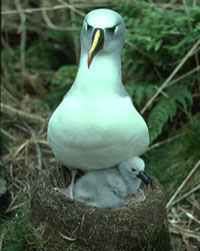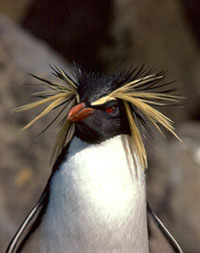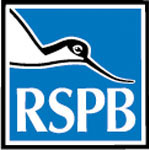 |
Wildlife and ConservationExplore the growing tristandc.com section as it is published to discover the extra-ordinary species only normally seen live by patient visitors willing to 'wait for a day' to explore often hostile habitats away from settlement Also learn about Tristan's 21st Century Conservation which puts the community in the forefront of international Conservation research and management There are regular features on Tristan wildlife and conservation in the Tristan da Cunha Newsletter, in addition to what appears on the website. Obtain your copy by joining the Tristan da Cunha Association. |
 |
| Atlantic Yellow-Nosed Albatross | Northern Rockhopper Penguin |
Information Pages
- Penguins - Find out about the Northern Rockhopper Penguin
- Albatross - Three species of native Tristan da Cunha Albatross Species
- Great Shearwaters - Endemic Sea-Bird to the Tristan Group with an amazing annual migration
- Skuas & Terns - Tristan's Terns and Skuas
- Vegetation - Tristan Islands' Vegetation Zones
- Botany - Plants of the Tristan da Cunha Islands
- Marine Life - Tristan's marine species
- Whales - Tristan's Whales and Dolphins. See also: Whale News for news and pictures of sightings
- Seals - Tristan's Antarctic Fur and Elephant Seals
Wildlife News Pages
- Recent Wildlife News - Tristan da Cunha Wildlife News, by year
- National Geographic 'Pristine Seas' Expedition - to the Tristan da Cunha islands 2017
- Gough Restoration Programme - to eradicate invasive non-native mice that are predating nesting seabirds
- MS Oliva Wreck Section - Several linked pages showing the 2011 wreck and its aftermath which dominated conservation news in 2011-2012
- Recent Conservation News - Conservation News from 2009
- Conservation News Archive - 2005-2008 Conservation News
Conservation Documents
- CBD 2014 Report - United Nations Convention on Biological Diversity 5th Report: Tristan extract
- World Heritage Site - Gough and Inaccessible Islands World Heritage Site 740
- Conservation Ordinance - Full Text of the 2006 Tristan da Cunha Conservation Ordinance
- Biosecurity Measures for Visiting Vessels - Compulsory for all vessels visiting Tristan and the Outer Islands
| We highly recommend the 'Field Guide to the Animals and Plants of Tristan da Cunha and Gough Island' edited by Peter Ryan which is the primary source for wildlife data on www.tristandc.com. See the Bookshop for details. |
Wildlife and Conservation PartnershipThe Tristan da Cunha Government works in partnership with UK conservation organisations (e.g. RSPB and UK Overseas Territories Conservation Forum) and the UK Governments Blue Belt Programme. Individual projects have been funded by the UK Government's Darwin Initiative and Overseas Territories Environment Programme. Tristan has also benefited from ongoing support from staff at the University of Cape Town who are involved with on-going research into the Tristan da Cunha Islands' unique wildlife. |



